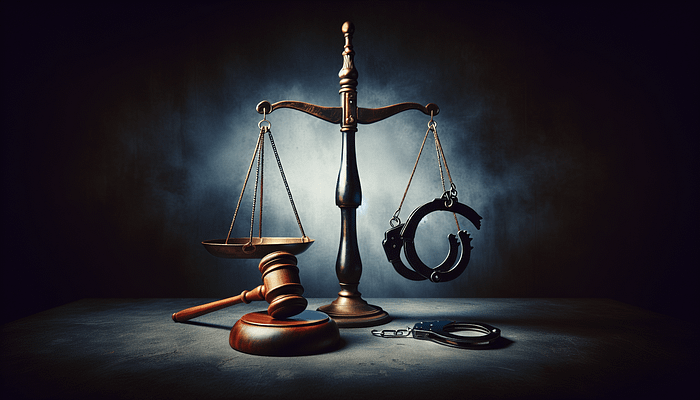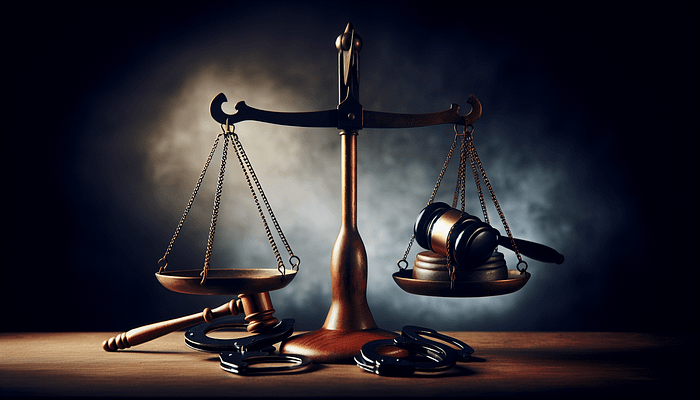What Does Defense Mean In Criminal Law?
Unlock the meaning of “defense” in criminal law, focus on Utah’s legal nuances, defenses like self-defense, and the vital role of criminal defense lawyers. Read more.
What Does Defense Mean in Criminal Law?

Introduction
Navigating the intricate world of criminal law in Utah can be challenging. But don’t worry — by the end of this article, you’ll have a clear understanding of what defense means in criminal law, focusing on the specificities and nuances relevant to Utah. Whether you’re a resident of Salt Lake City or a curious visitor to Utah County, knowing your rights and how they’re protected is crucial.
The Basics of Criminal Defense in Utah
In Utah, criminal defense refers to the legal strategies and actions taken to protect a defendant’s rights in a criminal case. This includes everything from pre-trial motions to presenting evidence in court. The goal is to ensure that the accused receives a fair trial and that their constitutional rights are upheld throughout the legal process.
Legal Definition
According to Utah Code Annotated (U.C.A.) § 76–1–102, criminal defense encompasses a wide range of legal protections designed to challenge the prosecution’s case. This can include contesting the validity of evidence, disputing witness credibility, and arguing that the defendant’s actions were justified or did not constitute a crime.
Types of Criminal Defenses
There are several types of defenses that an attorney might use to protect your rights:
- Affirmative Defense: This involves acknowledging that a crime was committed but providing evidence that negates liability, such as self-defense or insanity.
- Alibi: Proving that the defendant was elsewhere when the crime occurred.
- Mistake of Fact: Arguing that the defendant had a reasonable belief that negates culpability.
- Coercion or Duress: Demonstrating that the defendant committed the crime under threat or immediate danger.
Self-Defense
One of the most commonly misunderstood defenses is self-defense. According to U.C.A. § 76–2–402, a person in Utah has the right to use reasonable force to protect themselves or others from physical harm. This principle is vital in cases involving assaults or domestic violence.
Insanity Defense
Another complex area is the insanity defense. Under U.C.A. § 76–2–305, a defendant may be found not guilty by reason of insanity if it can be shown that they were suffering from a severe mental disease or defect at the time of the crime, rendering them incapable of understanding the nature of their actions.
Real-World Application in Utah
To make these concepts more relatable, let’s look at a real-world example involving a resident of Provo, Utah. Consider a scenario where John, a Provo resident, gets into a physical altercation at a local bar. He claims he acted in self-defense after being attacked. In this case, John’s attorney could invoke U.C.A. § 76–2–402, arguing the legality of his actions under Utah’s self-defense laws.
Pre-Trial Motions
Before even stepping into the courtroom, a good defense lawyer will file pre-trial motions to dismiss certain pieces of evidence or even the entire case. These motions are based on various legal grounds, such as improper procedures during evidence collection or insufficient evidence to support the charges.
Plea Bargaining
Sometimes, the best defense strategy is negotiating a plea bargain. This involves pleading guilty to a lesser charge in exchange for a more lenient sentence. This can be advantageous when the evidence against the defendant is overwhelming.
Example Case Study
Imagine Jane, a Salt Lake City resident, accused of burglary. Her lawyer might negotiate a plea bargain where she pleads guilty to trespassing, a lesser charge, and avoids harsher penalties like a lengthy prison sentence.
Common Misconceptions
Many misconceptions surround criminal defense. One of the most common is that hiring an attorney is only necessary if you’re guilty. The reality is, having legal representation is crucial regardless of your innocence or guilt. An experienced lawyer ensures that your rights are protected and can significantly affect the outcome of your case.
Misconception 1: Public Defenders Are Inferior
Another frequent misunderstanding is the belief that public defenders are less competent than private attorneys. While public defenders are often overworked, they are generally highly skilled. However, having a private attorney like Jeremy Eveland can offer more personalized attention and resources.

Why Understanding Defense Matters
Understanding the concept of criminal defense is not just for those facing charges. It also empowers you to make better decisions in your everyday life. Being informed about your rights can help you navigate interactions with law enforcement and understand the legal implications of your actions.
Protecting Your Rights
Criminal defense laws in Utah are designed to protect your rights. This includes the right to a fair trial, the right to confront your accuser, and the right to legal representation. These protections are fundamental to ensuring justice is served fairly.
Resolving Disputes
The criminal justice system also plays a crucial role in resolving disputes. Whether it’s a domestic violence situation in West Jordan or a DUI charge in Ogden, criminal defense attorneys work tirelessly to ensure that disputes are resolved justly.
The Legal Process in Utah
When you’re charged with a crime in Utah, understanding the legal process can significantly ease your stress. The process generally involves:
Arrest and Charges
Once you are arrested, you will be formally charged with a crime. These charges should be clearly stated, and you’ll be informed of your rights.
Arraignment
At the arraignment, you’ll enter a plea of guilty, not guilty, or no contest. This is your opportunity to hear the charges read aloud and to secure legal representation if you haven’t already.
Pre-Trial
During the pre-trial phase, your attorney will gather evidence, file motions, and possibly negotiate a plea deal. This phase can be lengthy but is crucial for building a robust defense.
Trial
If your case goes to trial, both sides will present their evidence and arguments. The judge or jury will then deliver a verdict.
Sentencing
If found guilty, the sentencing phase determines the penalties you’ll face. This could range from fines and community service to imprisonment.
How Jeremy Eveland Can Help
Navigating the intricacies of criminal defense law is daunting, but you’re not alone. Jeremy Eveland, a seasoned criminal defense attorney in West Jordan, has dedicated his career to helping people like you understand and maneuver through the legal system. By working closely with an attorney, you can build a robust defense that increases your chances of a favorable outcome.
To learn more, visit West Jordan Lawyer Jeremy Eveland.
FAQs
1. What should I do if I’m arrested in Utah?
If you’re arrested, remain calm and exercise your right to remain silent. Immediately ask for an attorney. Hiring a skilled criminal defense lawyer can significantly influence the outcome of your case.
2. Can I change my plea after the arraignment?
Yes, you can change your plea, but it’s crucial to consult with your attorney before making any decisions. Changing your plea can have significant legal ramifications.
3. What happens if I can’t afford an attorney?
If you cannot afford an attorney, the court will assign a public defender to your case. While public defenders are competent, having a private attorney can provide more personalized and dedicated service.
4. How can I ensure I get a fair trial?
A fair trial involves having competent legal representation, understanding your rights, and ensuring that all procedures are followed correctly. Your attorney will work tirelessly to protect your rights and build a strong defense.
Conclusion
Understanding what defense means in criminal law is vital for anyone navigating the legal landscape in Utah. From protecting your rights to resolving disputes, criminal defense laws play a crucial role in ensuring justice. Remember, for personalized legal advice and assistance, call Jeremy Eveland, Utah Lawyer, at (801) 613–1472.
Clap this article if you found it helpful, leave a comment with your thoughts, and subscribe to our Medium newsletter for updates. Jeremy Eveland 8833 S Redwood Rd West Jordan Utah 84088 (801) 613–1472
The information contained in this article is for information purposes only and is not legal advice. For legal advice, hire a competent lawyer in your jurisdiction.
